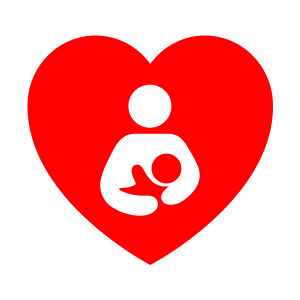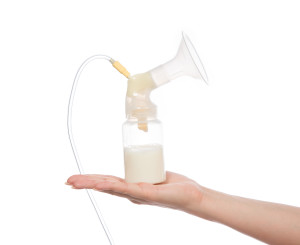 As a new mom, you’re worried about every little aspect of your new little one’s development. Is he sleeping enough? Is he warm enough? Is he eating enough? If you’re breastfeeding, the question of how much breast milk your baby needs can feel difficult to manage. If most of your baby’s feedings are at the breast, it can feel impossible to track how much he’s really eating. To help you demystify the most common breast milk consumption questions, we’ve outlined guidelines and tips to help you ensure your baby is getting just the right amount of breast milk each and every day.
As a new mom, you’re worried about every little aspect of your new little one’s development. Is he sleeping enough? Is he warm enough? Is he eating enough? If you’re breastfeeding, the question of how much breast milk your baby needs can feel difficult to manage. If most of your baby’s feedings are at the breast, it can feel impossible to track how much he’s really eating. To help you demystify the most common breast milk consumption questions, we’ve outlined guidelines and tips to help you ensure your baby is getting just the right amount of breast milk each and every day.
How Much Breast Milk Does an Infant Need?
Between months one and six, an average-sized breast-feeding baby will consume about three ounces of breast milk. This many seem like a small quantity, but keep in mind that your baby should be eating every few hours.
How Frequently Should You Breastfeed?
Your baby will likely be hungry every hour and a half to every three hours. Never go more than four hours in between feedings, even overnight. To track your feedings, count the length of time between when your baby begins to nurse, to when the next session starts again, rather than starting to count time when one session ends.
Infants should be breastfed eight to 12 times per day during month one. During month two and beyond, your infant should nurse seven to nine times per day. Talk to your OBGYN about your baby’s unique needs. He/she will be able to help you further refine your breastfeeding schedule.
How Frequently Should I Alternate Breasts?
It’s important to alternate breasts during feeding sessions to ensure your milk supply is maintained in both breasts. Try to give your baby the same amount of milk from each breast during each feeding session. The amount of time a baby needs to spend with each breast will vary from case to case. As a best practice, try to switch breasts when you feel your baby is about half way through a feeding session, and alternate which breast you offer first at the start of each session.
What are the Signs my Baby Wants to Nurse?
When your baby is hungry, he will let you know. Crying is not the only sign of hunger. In fact, it’s a late sign, and you’ll be better off feeding your baby before he becomes hungry and fussy. Signs that your baby is ready to nurse include:
- Sticking out his tongue
- Opening his mouth
- Moving his head from side to side
- Nuzzling against the breast
- Making a suckling expression with his mouth
- Placing his fists to his mouth
What are the Signs my Baby is Full?
You’ll know your baby has comfortably had enough breast milk when his sucking becomes slow, or he simply turns away from the breast.
How Long Should Each Breast Feeding Session Last?
Every mom-baby pair is unique, so talk to your OBGYN or baby’s pediatrician if you have questions or concerns regarding the average length of a breastfeeding session. Such factors that may impact the time it takes your infant to breast feed may include your milk supply, your let-down reflex (which causes milk to flow from the nipple), and if your milk typically flows quickly or more slowly. In general, babies become more efficient eaters as they get older, so your breastfeeding sessions should begin to go faster as your baby ages.
Talk to Your OBGYN and Your Baby’s Pediatrician
For any questions that you may have about breastfeeding your infant, whether it’s at day one, or 101, talk to your doctor. He/she will help you ensure your baby remains healthy, happy, and comfortably full.
More
 Tips to Not Only Survive, but also Thrive, During the First Few Months After Baby Arrives
Tips to Not Only Survive, but also Thrive, During the First Few Months After Baby Arrives
Giving birth is an extraordinary accomplishment. You may look at celebrities and friends on social media and think that days after welcoming your newborn into the world you should be out and about, sporting a bikini, and feeling energetic. Resist the urge to put too much pressure on yourself to recover quickly. It takes most women nine months to truly feel like they have recovered from their pregnancy. Every woman is different and each birth is unique, however there are some things that you can do to help your body heal effectively post childbirth.
Sleep when your baby sleeps.
Don’t be an overachiever. Your baby’s nap is not the time to do laundry or clean the bathroom. Your body needs rest in order to recover, and with nights interrupted by feedings and changings, you can expect to feel physically exhausted those first few months. Take every opportunity possible to gain extra hours of sleep. As your body recovers and your daily routine normalizes, you won’t require such frequent naps.
Take care down there.
If you tore your perineal area during delivery, or if you had an episiotomy, your body will need some extra time to heal and recover. Your OBGYN may recommend sitting in a few inches of water a few times a day to help keep the area clean. If you experience swelling, use ice packs to help soothe the area.
Get out of the house.
It may be tempting to stay in your pajamas and rest at home, but after a few days, and with your OBGYN’s clearance, you should start getting out of the house and adding some periods of activity to your day. Start simple by taking a walk around the block. Bring your baby with you in a stroller so that you can both benefit from some fresh air.
Have reasonable expectations about your home.
You may have liked your home organized and cleaned to a certain standard before your baby arrived, but take it easy on yourself after delivery. Do your best to stay organized and keep key areas like your bathroom and food prep area clean, but don’t have unrealistic expectations about laundry, dusting, and yardwork. Seek the help of a friend or family member the first few days if you strongly feel the need to tidy up.
Make meals simple.
Your baby’s frequent meals are going to take up a lot of your attention, especially early on. Make meal time simple for the rest of the family. Work together with your spouse to prepare some simple, freezable meals for the week. Just remember not to compromise on quality. You need to stay healthy, so make sure you are eating high quality simple meals, and remember, no alcohol if you are breastfeeding.
Stay in touch with your OBGYN.
If you have any questions or concerns during your recovery, don’t hesitate to contact your OBGYN. He/she will know best how to help you thrive, and not just survive, your first few months after welcoming your baby into your home.
More
 If you’re about to be a first time mom, you have many decisions to make, from nursery color schemes, to who you want with you in the delivery room, to the all important baby name. As you prepare for your baby to arrive, take some time to educate yourself on the benefits of breastfeeding. August is breastfeeding awareness month, which means now is the perfect time to learn how this parenting choice can benefit both you and your infant.
If you’re about to be a first time mom, you have many decisions to make, from nursery color schemes, to who you want with you in the delivery room, to the all important baby name. As you prepare for your baby to arrive, take some time to educate yourself on the benefits of breastfeeding. August is breastfeeding awareness month, which means now is the perfect time to learn how this parenting choice can benefit both you and your infant.
Benefits for Baby
- Optimal nutrition – Research shows that breast milk offers the highest quality nutritional benefits for your infant. Your breast milk will naturally contain all of the vitamins and nutrients your baby needs in the first six months of development.
- Immune-boosting benefits – Breast milk naturally contains important disease-fighting substances that will help to build your baby’s immune system. Studies have shown that your baby will be at a reduced risk of stomach viruses, lower respiratory illnesses, ear infections, and meningitis if breastfed at least during the first six months. This protection comes from a substance called secretory immunoglobulin A (IgA), which is present in the first milk your body produces for your baby.
- Reduced risk of allergies – Infants who are breastfed are at a reduced risk of developing allergies. In particular, babies who are fed a formula based on cow’s milk or soy tend to have more allergic reactions than those who are breastfed.
- Long-term protection – Studies show that breastfeeding may reduce your child’s risk of developing certain diseases later in life, including type 1 and type 2 diabetes, high cholesterol, inflammatory bowel disease, Crohn’s disease, and ulcerative colitis.
- Like mother, like child – A woman’s breast milk is specifically tailored to meet the needs of her child. Our bodies produce IgA in response to specific pathogens that we are exposed to throughout our lives, and those lgAs will be passed on to your baby during breastfeeding, offering optimal protection from those pathogens to which you have been exposed.
- Better brain food – A study of more than 17,000 infants found that children who had been breastfed showed enhanced cognitive development, as determined by their IQ scores and other intelligence tests, over those who were fed formula.
- Reduced risk of obesity – Breastfeeding may help your baby to develop healthy eating habits from infancy that will protect him/her from developing an unhealthy weight later in life. Breastfed babies learn to eat until their hunger is satisfied, and tend to carry this healthy habit into adolescence. In addition, compared to formula, breast milk contains less insulin, which stimulates the creation of fat.
Benefits for Mom
- Mental health – Breastfeeding can reduce a new mother’s stress level and her risk of postpartum depression. The National Institutes of Health reviewed more than 9,000 study abstracts and concluded that women who did not breastfeed or who stopped breastfeeding early were at a higher risk of postpartum depression. Breastfeeding also releases the hormone oxytocin, which stimulates feelings of relaxation.
- Emotional bonding – The emotional bonding between mom and baby that occurs during breastfeeding is an important part of both the baby’s emotional development, and your connection with one another.
- Long-term protection – Numerous studies have found that the longer a woman breastfeeds, the lower her risk for developing breast and ovarian cancer.
- Assists in weight loss – While you’re pregnant, your body automatically layers on extra fatty tissue so you’ll have enough fat stores to begin and support breastfeeding. It’s true that breastfeeding can help you lose your pregnancy weight naturally without compromising either your health or your baby’s (considering you are eating healthy). Your body will burn calories to make breast milk.
If you have questions about breastfeeding, or if you are still deciding if it is the right choice for you and your baby, contact your OBGYN today to discuss your options. The doctors at Chouchani, Sayegh and Bagnarello MD are dedicated to helping you and your baby achieve optimal health.
More
 Whether you are a first time mom, or are realizing that each child develops differently, a woman can experience difficulties breastfeeding at any time. Though breastfeeding is a natural process and is one that is best for both you and your baby, do not be frustrated or disappointed if it does not seem to come easily. What follows is a list of six of the most common breastfeeding issues and tips for overcoming each one.
Whether you are a first time mom, or are realizing that each child develops differently, a woman can experience difficulties breastfeeding at any time. Though breastfeeding is a natural process and is one that is best for both you and your baby, do not be frustrated or disappointed if it does not seem to come easily. What follows is a list of six of the most common breastfeeding issues and tips for overcoming each one.
Latching pain – Nipple discomfort is common when a woman first begins to breastfeed, especially for new mothers. If pain lasts more than the first minute after your baby latches, however, check your positioning. The optimal position is for the baby’s mouth to cover more of the areola below your nipple than above. When correctly positioned, baby’s chin and nose should touch your breast with his lips splayed out so that you cannot see your nipple.
Clogged ducts – The ducts of your nipples may clog if your breast milk is not completely draining after nursing. If your ducts are clogged, you may feel a hard lump on your breast, or your breast may be sore to the touch. If you begin to feel feverish and achy, you could have an infection, and should see your doctor. To help your body to clear the blockage, be sure to get enough rest, apply warm compresses to your breasts, and massage them to stimulate milk movement.
Thrush – This is a yeast infection in your baby’s mouth, which can spread to your breasts. Symptoms include itchiness, soreness, and rash. You will need an antifungal medication for both your nipples and your baby’s mouth to treat the infection.
Cracked nipples – If you find that your nipples are producing a bloody discharge during breastfeeding or pumping, know that it will not harm your baby. Cracked nipples could be caused by latching problems, improper breast pumping, dry skin, or thrush. To lower your risk for developing cracked nipples, check your baby’s positioning. You may also want to try breastfeeding more frequently but for shorter periods of time. Until your skin heals, treat your skin with clean water or an over-the-counter lanolin cream made especially for nursing mothers.
High milk supply – Also known as engorgement, having a high supply of breast milk could make it difficult for baby to latch to the breast. To help your baby latch, first try hand-expressing some milk to begin the flow and soften the breast. Breastfeeding more frequently may also help keep milk levels in check.
Mastitis – This bacterial infection in your breasts can be caused by cracked skin, clogged ducts, or engorgement. Mastitis causes pain and flu-like symptoms, including fever. Antibiotics will be needed to treat the infection. Also try applying a hot compress to the breast and empty your milk supply frequently.
If you experience any of these conditions or issues while breastfeeding, speak to your OBGYN. Breastfeeding should offer an important emotional bonding opportunity for you and your baby and should not be a cause of stress, discomfort, or health risk. For more on this topic, please visit the breastfeeding section on the patient education part of our website or check out these breastfeeding resources in Western New York.
More
 If you’re pregnant or thinking about becoming pregnant, the topic of breastfeeding has probably come up. Maybe you’re determined to do it, maybe the thought makes you nervous or uncomfortable. In honor of National Breastfeeding Awareness Month, we’d like to share the following information about what breast milk provides to help you make—or feel good about—your decision:
If you’re pregnant or thinking about becoming pregnant, the topic of breastfeeding has probably come up. Maybe you’re determined to do it, maybe the thought makes you nervous or uncomfortable. In honor of National Breastfeeding Awareness Month, we’d like to share the following information about what breast milk provides to help you make—or feel good about—your decision:
Better Nutrition: Science cannot replicate everything that makes breast milk the ideal food for infants. The vitamins and nutrients in a mother’s breast milk are easier for babies to digest, and it has the perfect amount of protein, fat, and carbohydrates required by your baby. Best of all, the composition of your breast milk changes as your baby grows, providing him or her with specific developmental and nutritional needs.
Better Health: Colostrum, the first milk, has high concentrations of antibodies that help protect the mucous membranes in the throat, lungs, and intestines of your newborn. And breastfed kids are less likely to contract childhood diabetes, multiple sclerosis, heart disease, and cancer before the age of 15. Breastfeeding can protect your child from asthma, bronchitis, ear infections, pneumonia, diarrhea and urinary tract infections, and breast-fed children have a decreased risk of tooth decay.
Boosted Brain Function: According to recent research, young children who were breastfed as infants scored higher on intelligence tests. Breastfeeding can increase a baby’s brain growth by 20 to 30 percent. The longer and more exclusively children are breastfed, the more intelligent they will become later in life.
Bonding: Breastfeeding and the closeness and comfort that come along with it can strengthen the bond between a mother and her baby. Physical contact is important to babies, as it helps them feel warm and safe. And the skin-to-skin contact boosts the mother’s oxytocin levels—oxytocin is a hormone that helps breast milk flow and can calm the mother.
Better Health for Mom, Too: It’s been proven that breastfeeding lowers the risk of breast cancer, ovarian cancer and anemia in mother, and it helps you lose your pregnancy weight.
Still not convinced? You can at least think about giving breastfeeding a try—that colostrum you produce in the first couple of days is called “liquid gold” for a reason.
Need support? There are many breast feeding resources available in Western New York. or you can call us here at Chouchani, Sayegh and Bagnarello. Our goal is to help you and your baby get the best possible start in life.
Photo courtesy of freedigitalphotos.net.
More
 There’s a lot to think about and learn when you’re expecting a baby, especially your first! And how you’re going to drive your baby around may be low down on your list of priorities.
There’s a lot to think about and learn when you’re expecting a baby, especially your first! And how you’re going to drive your baby around may be low down on your list of priorities.
But choosing and installing the right car seat is one of the most important things you’ll do as a new parent. In order to keep your baby as safe as possible, keep these tips in mind when purchasing:
- Infants should always be placed in a rear-facing car seat until they are 20 pounds and 1 year of age.
- Make sure that the car seat you want to buy fits properly in your vehicle. Not all car seats fit in all vehicles. Test the car seat you plan to buy ahead of time to make sure you can install it securely.
- The belt on the car seat should be fastened at chest level and tight enough so that you cannot place more than one finger between the strap and the baby’s shoulder.
- Never put an infant in the front seat of a car that has a passenger side air bag.
- If using a carrier-style car seat, check the weight restrictions. Some have a maximum weight limit of 15 pounds, which many infants will outgrow prior to turning 1 year.
- A car seat should be thrown out when it is older than five years. At this point, the materials have begun wearing down, compromising the integrity of the car seat.
- Never purchase a car seat from a yard sale or use one that comes from someone you don’t know. Even a minor fender-bender can damage a car seat’s integrity.
When you’ve purchased the car seat, you’ll want to make sure it’s installed correctly. Unfortunately, even with the LATCH system, sometimes installation can be frustrating and confusing. Luckily, most towns have police officers on staff who have been thoroughly trained in the installation of car seats and can check to make sure yours is safely in place. Ask your doctor, your hospital of choice or your pediatrician how and where to find this information.
At Chouchani, Sayegh and Bagnarello, we help our mothers-to-be keep their little ones safe and healthy, even before they’re born! If you’re looking for personal, complete prenatal care in Western New York, call our offices today to set up an appointment.
More
 There’s no getting around it: if you’re a mom, you’re going to have stress. Yes, you love your children, but the pressure of taking care of another person’s needs all day long—and sometimes part of the night—can drain you of energy and make you feel lousy. Here are four things you can do to reduce your stress and feel more in control:
There’s no getting around it: if you’re a mom, you’re going to have stress. Yes, you love your children, but the pressure of taking care of another person’s needs all day long—and sometimes part of the night—can drain you of energy and make you feel lousy. Here are four things you can do to reduce your stress and feel more in control:
Stop trying to be a “perfect” mother.
Between TV, magazines and websites like Pinterest, mothers see images of immaculate, perfectly organized houses and clean, smiling kids. Instead of trying to replicate that false perfection, try a few shortcuts:
- Cut down on laundry by letting your kids stay in the same clothes all day, even if they get a little dirty. Obviously, there are some stains you don’t want your child to wear all day, but a little juice, food or dirt never hurt anybody.
- Use paper plates and cups to save time and water usage. This means fewer dishes to wash and more time you can spend on the fun aspects of motherhood.
- Allow your house to be a little messy. Every bed doesn’t need to be made, every toy doesn’t have to be put away, and not every floor needs to be swept 20 times a day. Kids make messes, and that’s okay.
Realize that you’re not alone.
Go to any search engine and put in the search term “online motherhood support groups.” Pages and pages of results will pop up. The Internet can be a great source of support, advice and commiseration, which you can get on your own time, on your own terms. There are also real-life support groups in most towns, like MOPS (Mothers of Preschoolers), Mothers of Twins, Parenting without Partners and more. Look for groups in your area and try to attend some meetings, so you can connect with others who are in the same boat.
Know where to go for help.
Nobody has all the answers about motherhood, but again, the Internet can be a great resource. If you do join an online support group, you can ask questions of your fellow members. Or there are plenty of websites out there that can answer any question you might have—no matter how weird it seems to you, chances are somebody has asked it already. If your question deals with a health concern, call your pediatrician’s office, of course. And if she’s available, you can always ask your own mom or your mother-in-law.
Take some time for yourself.
This is probably the hardest one for most moms, but one of the most important. If you’re feeling exhausted, upset, resentful or anxious, you’re not going to be the best parent you can be. Whether it’s something as simple as a 20-minute soak in the tub while listening to music, a walk around the neighborhood, coffee with a friend or something more ambitious like taking an exercise or yoga class, you need a break from the pressures and responsibilities of being Mom, 24/7.
From all of us at Chouchani, Sayegh and Bagnarello, have a happy, healthy Mother’s Day. If you or someone you know is looking for a top OB-GYN practice in Buffalo, please give our friendly staff a call today.
More
 For the best chance of having a healthy baby, you want to have a healthy pregnancy. Luckily, there are plenty of resources in Western New York that can help pregnant women do just that. Here are a few options:
For the best chance of having a healthy baby, you want to have a healthy pregnancy. Luckily, there are plenty of resources in Western New York that can help pregnant women do just that. Here are a few options:
Catholic Health’s WomenCare program offers a wide variety of prenatal classes, given at either Mercy Hospital or Sisters of Charity Hospital, including:
- Prepared Childbirth – Designed mostly for the first time mom, these classes cover relaxation and breathing techniques and more.
- Prepared Childbirth Refresher – This class refamiliarizes you with what to expect during and after pregnancy.
- Preparing to Breastfeed – Learn about the initial breastfeeding experience and what to expect at home.
- Twinformation Classes – These cover the special needs of twin pregnancy.
- Baby Talk – Topics discussed include common newborn concerns such as bathing, breastfeeding, bottle feeding and more.
- Sibling Classes – introduces pre-school and young children to the exciting role of being a big brother or sister
Kaleida Health holds prenatal classes at both Millard Fillmore Suburban Hospital and Women & Children’s Hospital of Buffalo. Their classes cover topics such as:
• Labor and delivery
• Breathing techniques
• Exercises
• Caesarean births
• Recovery
• Parent classes
• Infant feeding and care
• Sibling classes
• Infant safety and CPR
• Infant development and stimulation.
If you are interested in natural childbirth, you can explore the options presented by WNY Childbirth Education and Doula Services. They offer an 8-week series of natural childbirth classes that promise to teach students about the labor process and help to create a set of skills and techniques to use in labor instead of medication. They also offer a “One Day Crash Course” for moms that have already been through labor and birth before, or for anyone with a quickly approaching due date that doesn’t have eight weeks. The crash course lasts about five hours and covers the stages of labor, labor coping techniques, coaching skills, and birth choices.
Other options include BlueCross BlueShield’s Right Start Prenatal Program for its members in Erie County and the Young Parents Program sponsored by Catholic Charities of Buffalo, which provides services both in the home and at the Ken-Ton Family Health Center and Mercy Hospital.
Chouchani, Sayegh and Bagnarello is an OBGYN practice in Buffalo where we are committed to helping our patients achieve a healthy pregnancy. We believe in supporting the total health of our patients and our community. If you have any questions about how to have a healthy pregnancy, please call or contact us anytime.
More
 As a new mom, you’re worried about every little aspect of your new little one’s development. Is he sleeping enough? Is he warm enough? Is he eating enough? If you’re breastfeeding, the question of how much breast milk your baby needs can feel difficult to manage. If most of your baby’s feedings are at the breast, it can feel impossible to track how much he’s really eating. To help you demystify the most common breast milk consumption questions, we’ve outlined guidelines and tips to help you ensure your baby is getting just the right amount of breast milk each and every day.
As a new mom, you’re worried about every little aspect of your new little one’s development. Is he sleeping enough? Is he warm enough? Is he eating enough? If you’re breastfeeding, the question of how much breast milk your baby needs can feel difficult to manage. If most of your baby’s feedings are at the breast, it can feel impossible to track how much he’s really eating. To help you demystify the most common breast milk consumption questions, we’ve outlined guidelines and tips to help you ensure your baby is getting just the right amount of breast milk each and every day.






